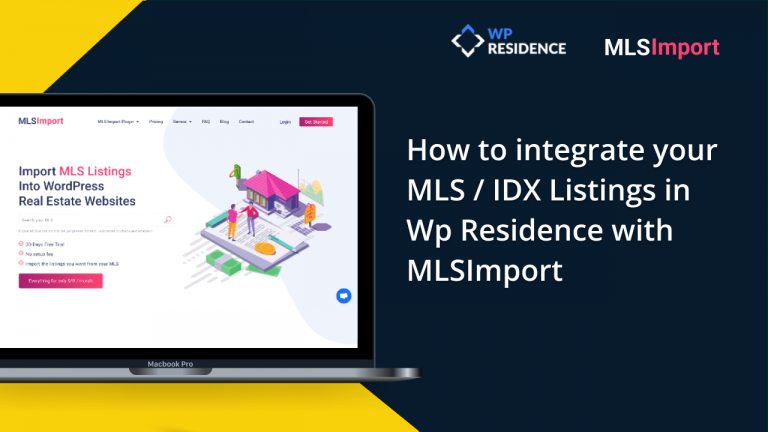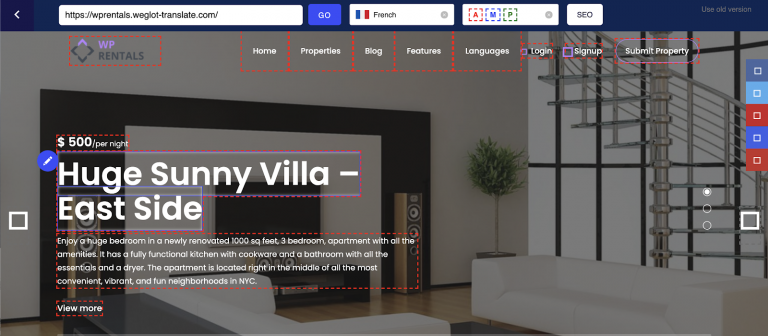Since it surpassed the housing financial crisis back in 2012, the real estate business has been growing steadily, and the competition between agents has gotten even stronger.
The old business paradigm, of maximization and self-interest, is fading and realtors must adapt to the new community-based world in which they operate. Proficient marketing skills, both in an online and offline medium are necessary to stand out from the crowd.
The internet has brought about a plethora of opportunities for a realtor to run his business. Hence there is a vital need for real estate agents to have a professional digital presence. Based on consumer studies, 92% of home buyers begin their home search online.
The optimal solution is to create an engaging identity for your business and start growing your network both online and offline.
The following article lists 25 tips to help you build a robust marketing strategy for your real estate business.

1. Create an excellent real estate website
Today the internet has become the first search resource for consumers when they are prospecting a purchase. This is also true for home buying and renting. On the web the interface is a significant part of the brand as your potential clients will learn about your offer through your website.
WordPress is a popular content management system that offers you a complete set of themes and tools to create a beautiful site. You only have to think of getting a great domain name and a web host for your website.
2. Set up a Google My Business account
Google 3-pack is the latest way of listing businesses in location-based search results. By creating a profile in Google My Business, home buyers can find you in Google Search, Google Maps, and Google+.
This is a necessary step to increase your site visibility and reach online users fast. There are high chances to get in the top three non-paid positions on Google if your website provides valuable content.
3. Register to business directories online
If you want a high chance of being discovered, list your website in major business listing directories and keep your information accurate on all websites. Listing sites bring almost half of all site traffic for real estate searches, so this is an essential step in your marketing plan.
There are general directories you could register such as Yelp, Yellow Pages, Angie’s List, Local.com, Craigslist and specific real estate websites like Trulia, Zillow, and Realtor.com. Some of them offer the ability to advertise as an agent on their site, and you can add unique visuals and text descriptions to attract visitors. They also allow users to review real estate agents, so it’s an excellent opportunity to get your 5-star ratings.
4. Get Social
Social networking is a great way to interact with your customers, share news and promote your offer. Create your profile on all the big social media networks: Facebook, Youtube, Twitter, Pinterest, Google +, Instagram and add social sharing buttons to your website pages. This way you will encourage your visitors to share your content on their profiles.
If you include many great images in your property portfolio, then consider adding them to a Pinterest board or on Instagram too. Pinterest is a highly popular network for pictures, and you can create endless image boards so consider adding one for each property to highlight every aspect of your offer.
5. Be easy to contact
On your website, your visitors shouldn’t lose time searching for a way to get in touch with you. Be sure you display your phone number, email, office address and any other contact info in an easy-to-find and readable way.
You can add your info in the footer area or consider creating a dedicated Contact US page. Choose a theme that has a contact page template with a responsive design, and consider adding visuals such as office photos or a Google Map.

6. Add excellent content
You have packed your website with property listings. Next, you should consider sharing more valuable content to your users by creating a blog. This will help you get more traffic to your website and keep your audience engaged with your business.
Publish and regularly update your blog with quality articles on topics that would interest your target audience. These could be home market news, community life inserts, interviews with local partners. Consider inserting local-oriented keywords in your posts to ensure that your content ranks in the top positions for home searches in your area.
7. Include great photography
A real estate website achieves success with excellent photography. This is one of those cases when you need to hire a professional with experience photographing architecture. Or, if you’ve got the skills and the cutting edge photo gear, you can start producing beautiful quality images for your site by yourself.
Remember that it is essential to have beautiful photos of your portfolio properties. And not only that, but it also pays to showcase the best local images. After all, the vicinity of a house makes a significant difference in closing the deal. Make use of the landmarks your town or area has to offer with high-quality photos.
8. Create a virtual tour
Create engaging virtual tours for your website visitors to help them get an accurate preview of your property. A virtual tour is a great asset to a real estate website. The visitor will be able to navigate from a scene to another and learn information while continuing the tour.
With these engaging tours, you will save your customers’ precious time and help improve your customer relationship as they will understand more of your offer before contacting you.
9. Make a video
YouTube is the second largest search engine and a great marketing tool so you can start making your videos to attract your audience. You can embed them on your website and share shorter versions (30 to 60 seconds) on other social networks or incorporate them in newsletters.
Videos are most valuable for Google rankings and have a captivating effect on internet users. Add relevant keywords and descriptions to your video to ensure a high rank in search results. Cartoons and animated infographics are two of the most popular video content in the present. You could approach a graphic design agency to help you with this type of videos. Remember to keep it short, industry related and locally focused to have the desired effect.
10. Set up a live webinar
Producing a live event for your customers may be a nerve wrecking thing, but this is an excellent marketing tool. This will help your business attract attention and an expert reputation. Topics for a great webinar :
- a presentation of a niche subject
- a panel discussion of an important issue your community
- a useful how-to tutorial
- an engaging Q&A session or an interview with an industry expert
Send out invites through emails or promote it on your social media profiles. Once they subscribe to your webinar, this becomes an excellent tool for lead capture. The webinars can be uploaded to your YouTube account and can be valuable video content permanently available on your website.
11. Start an email campaign
After you collected emails with your website, it is time to build an email campaign.
Send your email subscribers useful and exciting content: new houses on the market, homes open for viewing, local events.
You could tailor your newsletters based on the previous subscriber actions. If they scheduled an open house, you could send them emails with nearby homes on the market. Or if they attended a webinar or a Q&A session you could offer them a free ebook to download from your site. This sensible approach will keep your users interested in your offer.
12. Optimize your website for mobile
Nowadays consumers spend most of their online time on their mobile devices. A recent study has shown that over 80% of home shoppers are now searching properties using a smartphone or tablet. So it is vital that your website is mobile friendly.
Pay attention if your mobile users can navigate through your site easily and quickly. Consider adding responsive apps for your site users to contact you, book or leave a review.
13. Add client testimonials
Every good reputation relies on what clients say about you, so focus your efforts on providing the best customer support.
Testimonials are validation signs for your business so when a client has been satisfied with your services get in touch and ask for a testimony. Consider adding a testimonial page or place them strategically on your website. You can also share them on social networks at given times.
14. Offer online scheduling solution
Having an online reservation system installed on your property page is a priority.
After getting your potential customer’s attention with beautiful visuals and useful info, next, you should provide visitors with schedule or booking options.
15. Start a PPC campaign
If you have polished your website SEO and packed it with top-rate content, then you should start thinking of advertising your business online. Organic search is more than beneficial. However, there is a time when you have to pay to get ahead of your competition.
Set up your AdWords correctly and you will reach your audience instantly. That means bidding on targeted keywords (community name, city, state) and designing useful landing pages.
More so, paid ads on social media networks have increased their efficiency of reaching clients. With Facebook, you have great segmenting audience features, and that means you are only paying to reach highly targeted prospects.
16. Leverage call tracking
In your paid search campaign it is essential to use call tracking. Your client will most probably call you to schedule a home viewing. So it is critical to track the ads that drive calls.
If you have opted for a click-to-call ad for mobile using clients or just included the phone number at the bottom of your PPC ad, you will be able to track which ads and keywords are performing well.
17. Choose a niche market
If the competition in your area is tough to crack, consider going on a niche route for your real estate business. Stand out from the crowd and make a name for yourself by choosing a specialty for your business.
Consider disregarded options like properties on sale by owners, and growth opportunities such as single and retired seniors home buyers or holiday condominium rentals. Choose your niche market and become the best agent for it. You will gain a guru reputation in your line of business, and you’ll always be in high demand.
18. Local sponsorship
As a local business, you are also a community member. Consider adding your contribution with sponsorships for local sports, cultural or school events. This is also an excellent opportunity to leave a memorable mark for your prospects. Being a sponsor often means you will get your business name and logo on banners, branded t-shirts, program posters or flyers.
19. Local business partnerships
Consider developing connections in your business community and leverage those by cross-promoting each other’s businesses. Working together with other local entrepreneurs will ensure that your real estate marketing efforts have a successful outcome.
A small business will benefit from valuable connections with local service vendors, chambers of commerce, non-profit boards and art associations.
As a realtor, your clients will expect you to recommend the best of landscapes services for example. You could team up with your partners and organize joint events in your local community, and lastly, you can further develop your offline network with social media platforms such as Linkedin or Alignable.
20. Direct marketing for identified leads
The internet lives its glory years now, but traditional advertising will always be an active component of a marketing plan. When you have targeted your audience and have collected the addresses of potential buyers in your area, consider mailing them old school postcards to let them know about you.
21. Organize seminars for home buyers
We’ve mentioned earlier the benefits of creating relevant webinars for your audience. You can take this strategy offline and organize a free event for your community to offer education in the real estate industry.
Hosting a seminar on the basics of home buying, for example, will take vast resources but the result is worth the efforts. Since they seek to improve their knowledge, your attendees will be impressed and remain hooked on your next events. This creates a relationship that will further bear fruit when they’re ready to buy a home.
22. Write articles in local magazines
Establish yourself as a local expert and get yourself featured in local magazines or newspapers. This will ensure your brand and name awareness. Focus your attention on your local community to discuss relevant topics and get their feedback to find out the most pertinent subjects to elaborate.
Make use of your knowledge and write about the touristic potential of your town or a complete analysis of the housing market.
23. Branding and business card
Your business is not only about selling or renting properties. It should have a personality of its own. Develop your brand’s visual mark by creating an impressive business card to hand out to potential clients. Consider also to stock up on branded products to offer freely to your clients such pens, notebooks, and other freebies people love.
24. Reward your clients and keep in touch
A close deal doesn’t mean an ended relationship. Make yourself memorable to your clients and send them professional gifts to thank them for their purchase. Consider leisure packages such as theatre tickets or restaurant gift cards.
Build a good relationship and regularly keep in touch with past clients by sending anniversary and holiday cards. This way you will make sure they will recommend you to their friends.
25. Set up a referral system
Or you could reach future homebuyers by setting up a referral offer. Provide your past clients with a commission share if they recommend you to friends, family and in their working sphere.
Secondly, you can establish a referral agreement with local service providers such movers, painters, landscapers. And, finally, you can work out mutual benefits by collaborating with realtors outside your area. If you know a good agent in another city, you should refer business their way so that they can send business back to you.







